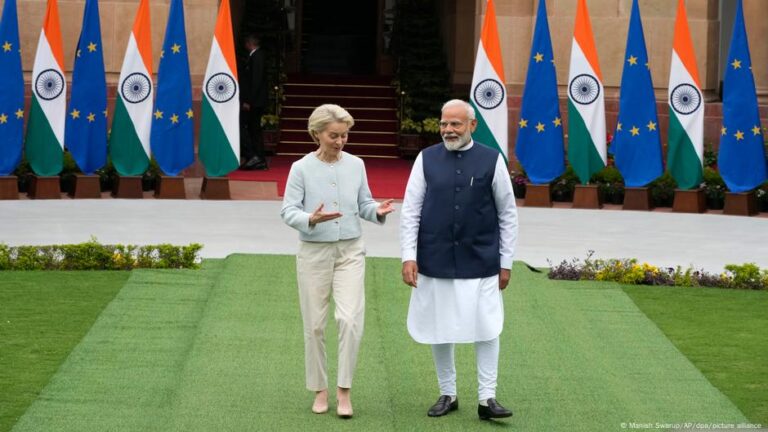The year began on a high note for the European Union and India. In February, European Commission President Ursula von der Leyen visited New Delhi and, alongside Indian Prime Minister Narendra Modi, instructed officials to resolve remaining differences and move forward on a long-delayed free trade agreement.
But that momentum was disrupted in July, when India was drawn into the EU’s 18th sanctions package against Russia. The move targets New Delhi’s refining of discounted Russian crude and the export of those products, some of which are sold to Europe.
Could this sanctions development derail a potential EU-India trade deal? Experts argue it won’t, saying the US threat of imposing tariffs of up to 50% on Indian goods poses a far greater challenge than the impact of the EU’s sanctions. And, paradoxically, that may work in the EU’s favor.
What are EU’s sanctions on India, and will they matter?
As part of efforts to cut off funding for Russia’s war in Ukraine, the EU last month banned imports of refined petroleum products originating from Russian crude. This ban applies to such products coming from any third country, including India.
The EU sanctioned Nayara Energy, an Indian refinery partly owned by Russian energy giant Rosneft. “For the first time, we’re designating a flag registry and the biggest Rosneft refinery in India,” EU foreign policy chief Kaja Kallas posted on X.
Nayara Energy was quick to push back, calling the move hypocritical.
“While many European countries continue to import Russian energy through various sources, they take a high moral ground by chastising and sanctioning an Indian asset for processing Russian crude largely used by its domestic population of 1.4 billion Indians and businesses,” Nayara Energy said in a statement in late July.
However, experts told DW the EU’s single designation is largely symbolic and unlikely to significantly impact India’s energy trade or EU-bound exports.
“The EU’s sanctions lacks bite and will be difficult to enforce,” said Garima Mohan of the German Marshall Fund of the United States, who researches Europe-India ties. “These exports are by no means running the Indian economy.” India could easily pivot by substituting its exports with fuel refined from non-Russian sources, such as Iraqi oil.
Jacob Funk Kirkegaard, an economics expert at the Brussels-based Bruegel think tank, agreed. “It is definitely an escalation by the EU. But I would also say it won’t hurt trade negotiations,” he said.
Instead, he argued the bigger pressure on India right now is coming from the United States.
Could US tariffs drive India closer to the EU?
As both the EU and India seek to secure stable trade relationships amid an increasingly volatile global economy, experts say the threat of high US tariffs on Indian goods could strengthen their mutual interest in finalizing a free trade agreement.
“First of all, the fact that there is no trade agreement between the US and India, then this mindless escalation by [US] President Trump,” Kirkegaard said, “means India’s desire to diversify away from the US and towards the EU has probably increased.
“India now needs a deal with the EU a little more than when it had arguably better ties with the US,” he added.
Mohan arrived at a similar conclusion. “In a roundabout way, I think the shake-up in the India–US dynamic will end up benefiting the EU,” she said. “Given this tariff announcement, India needs reliable and predictable economic partners, it needs investments.”
The EU has also taken a more measured approach during trade negotiations — particularly in the agricultural sector which employs close to 44% of India’s population. If India were to provide greater access to European or US companies, there are fears it could cause job losses at home.
“The EU understands that if we insist on a larger opening in the agriculture sector there will be no deal,” said Kirkegaard, adding that the EU “understands India’s political and economic sensitives in the agriculture sector far better than Trump.”
US pressure, EU benefit — and a potential win for Ukraine?
If India were to scale back purchases of Russian oil to avoid triggering punitive US tariffs, it could reduce a key Russian revenue stream for Moscow’s war effort. That would align with EU and Ukrainian interests.
However, an Indian diplomat who spoke with DW on the condition of anonymity warned that removing Russian oil from the global supply could lead to a spike in prices — which would in turn hurt everyone, not just Russia.
Kirkegaard questioned why Trump “has not threatened China with the same, which buys more Russian oil.”
Experts agree that the EU’s designation of Nayara Energy is unlikely to shift the war calculus for Russian President Vladimir Putin. But India’s own math might change — and that could depend more on Washington that Brussels.
So, while EU-India relations have faced a setback, the overall momentum toward a trade agreement remains resilient. What began as a promising year could still culminate in a breakthrough — especially if shifting geopolitical dynamics bring New Delhi and Brussels closer together.


